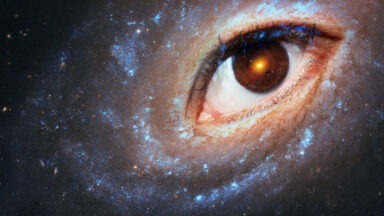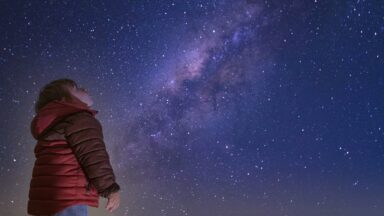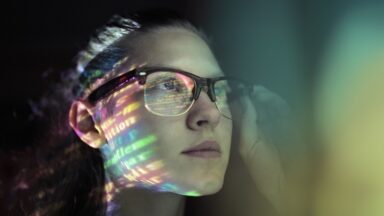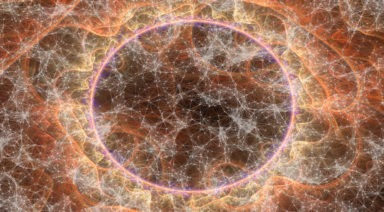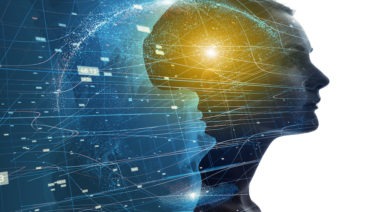Gifts From the Divine; Lightning Strike Survivors Gain Abilities
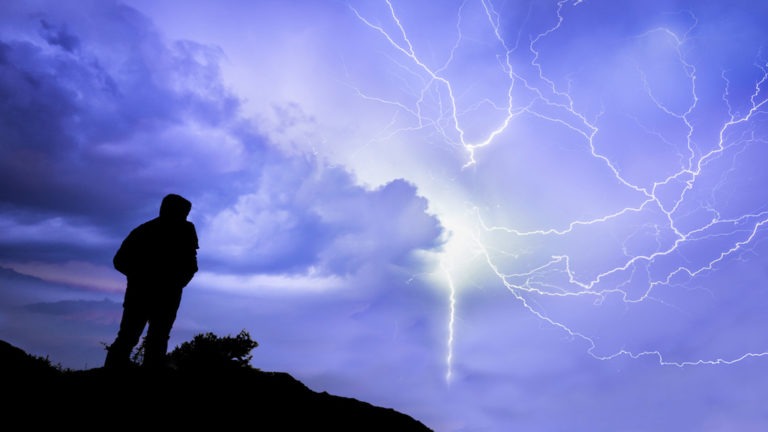
We’re all familiar with this supernatural Hollywood motif: an otherwise normal protagonist gets struck by lightning and develops superpowers. Similar stories are told about comic book heroes who encounter substances or are bitten by creatures that imbue them with superpowers, and a story unravels about their metamorphosis.
As art often imitates life, this idea of lightning strike survivors gaining abilities after being hit isn’t just science fiction. Numerous stories have been recounted by people who have not only been struck by lightning, but who have also been declared dead — only to come back to life forever changed, with talents and abilities they’d never had before. In a sense, these survivors have been reborn, but reborn into the same body.
The Story of Dr. Tony Cicoria
In 1994, Anthony Cicoria, M.D., an orthopedic surgeon in Chenango County, New York, was on a pay phone with his mother when he noticed a storm brewing in the distance. Describing what happened next, he said, “With my left hand I pulled the phone hand-piece away from my face to hang it up. When it was about a foot away from my face, I heard a deafening crack. Simultaneously I saw a brilliant flash of light exit the phone hand-piece I was holding. A powerful bolt of lightning had struck the pavilion, traversed through the phone striking me in the face, as its massive electrical charge raced to ground.”
Cicoria found himself first flying backward, and then forward. After a minute, he took note of his surroundings and saw his lifeless body on the ground with a huddle of people around him — a woman was giving him CPR.
He realized then that he was dead. His life flashed before his eyes, and he reported being surrounded by a bluish-white light that flooded him with bliss. And then he returned to his body, in pain, looking at the woman hovering over and attempting to revive him. According to The New Yorker, “After a minute or two, when he could speak, he said, ‘It’s O.K.— I’m a doctor!’ The woman, who turned out to be an intensive-care-unit nurse, replied, ‘A few minutes ago, you weren’t.’”
Cicoria explained that up until this incident, he’d worked 10- to 12-hour days while raising three children, leaving room for little else. But after this near death experience, he began craving classical music, which was strange to him because he’d never before had an affinity for much beyond classic rock. But he was so moved by his passion that he drove to the closest music store, nearly an hour away, and purchased his first classical album: a CD of Chopin’s piano compositions.
Soon after, Cicoria acquired a piano from his babysitter and then bought some beginner piano books, as well as the sheet music to the songs on the Chopin CD he’d been listening to over and over again.
A few months later, he had a dream in which he says felt like another out of body experience. He entered a concert hall and saw himself on stage, playing haunting compositions that, after a few moments of listening, he realized were his own. It was the crescendo of his own music that awoke him at 3:15 in the morning. Cicoria climbed out of bed, walked to where the piano was stationed, and attempted to play what he’d heard. But he was unable to.
He continued to teach himself piano, and every time he sat down to practice, his own compositions would begin to play. “If I tried to ignore it, it became more insistent. I became obsessed with the piano and came to believe the only reason I survived the lightning was because of the music,” he said.
Eventually, he hired a Julliard-trained teacher to give him piano lessons and began practicing relentlessly. After attending the Sonata Piano Camp, he was introduced to the late Dr. Oliver Sacks, who interviewed him for a book he was writing, Musicophilia: Tales of Music and the Brain. “At the end of that day, as we shook hands in his doorway, he looked into my eyes as if looking through me and said, ‘The music from the dream went through an awful lot of trouble to get here, the least you can do is write it.’ I was so shaken by what he said, I went home and bought a Sibelius music writing program,” Cicoria said.
Cicoria has now performed his highly acclaimed compositions for crowds across the world.
Scientific Phenomenon or a Gift From the Divine?
There is a term for Cicoria and others like him — an “acquired savant” — and it describes a person who exhibits savant skills after a serious brain or central nervous system (CNS) injury or disease. One moment they’re the person they’ve always been, and the next they have acquired a skill or talent that defies explanation.
The more spiritual among us are apt to credit divine intervention for savant status. Scientists, on the other hand, are left scratching their heads to come up with a logical explanation. In any case, it is impossible to deny the newfound talents of these people who have acquired such gifts nearly instantaneously. They have pushed past not only what most people would deem to be prodigal, but in so doing, they have metamorphosed further, becoming mythic — as Phoenixes rising from the ashes to be reinvented as gifted human beings, almost supernaturally so.
As an acquired savant, Cicoria became fanatical, and music became his raison d’etre. He attributes the gifts of composition to the divine, refusing to take any credit for them.
In a sense, such lightning strike survivor stories can function as myths, showing us what we are capable of doing when we feel there’s a higher purpose. But for those who wonder, if you get struck by lighting, will you get superpowers — the safest response is no, whether it’s because such phenomena are rare or because the lightning was divinely sent, there’s no guarantee such an event will have a happy outcome.

Tony performing one of his compositions
Scientists searching for material answers surmised that lightning strikes damage the anterior temporal and orbitofrontal cortex of the brain, quieting “parts of the brain that normally inhibit or put the brakes on parts of the brain responsible for vision and perception.” Neuroscientists who accept this explanation, though, “suggest that sudden savant syndrome is brought about by damage in parts of the brain that normally act as a kind of check on the way information is filtered into a person’s conscious experience.” However, this point is negated by the sheer fact that anterior temporal and orbitofrontal cortex damage is not true in all cases.
Newsweek writer Joseph Frankel wrote that “many of these ‘sudden savants’ worked extremely hard to improve their skills. The lightning strike left Cicoria with a hunger for piano music that drove him to throw himself into playing, starting practice on the piano at 4:00 a.m. before work and then again well into the night once he got home.” Though this doesn’t explain what sparked the drive in Cicoria, or why he developed such a predilection for a genre of music he never had interest in.
What is known by scientists and laypersons alike is that a sudden brain image can unlock, or perhaps create, a sudden talent or skill. This is all that is known, and at this point all else is speculation. But if we were to take a broader approach to this, perhaps a new picture would arise.
For instance, if we regard the brain as no more than a receiver of information (similar to the way a radio receives waves that are existent and invisible to the senses), then we may understand that an altered brain can begin to receive signals that are existent but have not been accessed.
Science is not completely averse to this idea, especially in cutting edge branches such as quantum physics that recognize consciousness — or the quantum field (that which Einstein called the unified field) — as a singular and all-encompassing complex network of reality. In such a case, the brain affected by a lightning strike or other similar trauma may simply take in information that has always been available to it, yet never before accessible.
Cicoria said of his own experience, “What is clear to me is that my consciousness survived death and I was able to verify details of my near-death and out-of-body experience that I would have no conceivable way of knowing except through conscious travel of my spiritual self outside of my body.”
Scientists often describe near death, out of body experiences as artifacts of the brain, to those who have had such startling experiences there is a reality that cannot be understood by those, including scientists, who have not had them. And, in the cases wherein so-called superpowers or talents arise due to a person’s brush with death, science is left speechless.
What Is 'Vibrate High' and How to Raise Your Vibrational Frequency

Everything in the universe, including our thoughts and emotions, has a vibrational frequency that influences how we feel, act and relate to others. When our vibrational frequency is high, we experience greater well-being, clarity and spiritual connection. In this article we explore what it means to vibrate high, how to identify your current vibrational state and what practices can help you raise your vibration in a sustained way.
Table of Contents
- What Does It Mean to Vibrate High?
- Am I Vibrating High or Am I Vibrating Low?
- Raising Your Vibration: Essential Practices and Habits
- What Can You Achieve by Vibrating High?
- The Science Behind Vibrational Frequency
- Vibrational Frequency and Spiritual Development
- Strategies for Maintaining High Vibration Over the Long Term
What Does It Mean to Vibrate High?
Vibrating high refers to the level of vibrational frequency we emit through our thoughts, emotions and states of consciousness. Just as everything in the universe vibrates, we also project an energetic frequency that influences our perception, our decisions and the reality we co-create. A high vibration manifests through elevated emotions such as love, gratitude, joy, compassion and trust.
The importance of vibrating high lies in its direct impact on our daily experience. A high vibrational frequency favors well-being, enhances inner clarity and attracts people and situations in tune with that energy. On the other hand, a low vibration can generate emotional blockages, conflictive relationships or repetitive patterns that limit our growth. Learning how to vibrate high allows us to take responsibility for our energetic state and transform our lives from the inside out.
Am I Vibrating High or Am I Vibrating Low?
To know if you are vibrating high, observe how you feel physically, mentally and emotionally. People with a high vibrational frequency tend to feel at peace with themselves, face challenges with a positive attitude and cultivate healthy relationships. They also commonly experience synchronicities, creative inspiration and a sense of purpose.
Conversely, when someone vibrates low, emotions such as anxiety, frustration, fear or judgment predominate. The energy feels dense, it is difficult to maintain motivation and everything seems to go uphill. Recognizing if you are vibrating low is fundamental to initiate a change, since raising your vibration is possible with intention, awareness and small daily actions.
Raising Your Vibration: Essential Practices and Habits
Knowing how to raise your vibration does not require drastic changes, but rather incorporating daily habits that strengthen your energy, your presence and your inner connection. These practices help you sustain a high vibrational frequency, cultivate positive emotional states and live with greater coherence and vitality.
- Daily meditation: Dedicating a few minutes to inner silence regulates the nervous system and improves mental clarity. Constant practice allows you to tune in to a higher and more stable vibration.
- Conscious gratitude: Intentionally giving thanks shifts your mental focus and elevates your emotional state. It is one of the fastest ways to raise your vibrational frequency.
- Conscious eating: Eating fresh, natural, nutrient-rich foods sustains your vital energy. Avoiding processed and mindful eating also influences your vibration.
- Body movement (yoga, dance, walking): Moving the body unblocks stagnant energy and promotes inner balance. Activities such as yoga or dancing help to release tension and raise the frequency.
- Listen to high vibrational music: Music has a direct effect on your energy field. Choose sounds that inspire you and connect you to higher states of consciousness.
- Connection with nature: Being in contact with the natural environment harmonizes body and mind. Walking barefoot, breathing fresh air or simply observing the sky restores your energy.
- Creative visualization and affirmations: Using the mind in a positive way transforms your frequency. Visualizing what you desire and repeating affirmations raises your vibration and focuses your intention.
- Laugh, enjoy and surround yourself with positive people: High emotions are contagious. Sharing time with people who nurture you emotionally improves your vibrational state.
- Rest and restful sleep habits: Good sleep allows the body to regenerate and the mind to quiet down. Deep rest sustains a high vibrational frequency in the long term.

What Can You Achieve by Vibrating High?
Maintaining a high vibrational frequency not only improves your internal state, it also transforms the quality of your experiences. When you vibrate high, your energy becomes consistent with opportunities, connections and situations that reflect that same level of well-being. This internal change manifests in specific areas of life, generating a deep and lasting impact.
- Attract money and abundance: A high vibration connects you with the energy of trust and deservingness. This facilitates openness to new economic opportunities and a healthier relationship with giving and receiving.
- Improve relationships and bonds: When your frequency is high, you attract people who are in harmony with your energy. Relationships become more authentic, conscious and enriching.
- Elevate your emotional well-being: Feelings such as peace, joy and gratitude become more frequent and stable. This strengthens your ability to respond to stress and improves your quality of life.
- Connect with your purpose: Vibrating high helps you listen more clearly to your inner voice. This facilitates decisions aligned with what truly inspires you and gives meaning to your path.
- Expand your spiritual awareness: As you raise your frequency, you access states of greater connection with the subtle. This opens the door to experiences of unity, intuition and inner expansion.
The Science Behind Vibrational Frequency
The idea that everything vibrates at a certain frequency is consistent with the principles of modern physics. Matter, energy and even our thoughts and emotions are made up of vibratory fields that manifest at different levels of density and movement. The higher the frequency, the more subtle and expansive its manifestation.
Vibrational frequency is not just a theoretical notion: it has practical implications in everyday life. Studies in neuroscience, psychology and physiology show that positive emotions such as gratitude, joy or compassion generate beneficial effects on the nervous system, strengthen health and favor broader states of consciousness. These emotions, when sustained over time, raise the overall vibration of the body and mind.
In contrast, emotions such as fear, anger or sustained sadness are associated with lower frequencies. These can weaken the immune system, affect mental health and limit our perception of possibilities. Understanding how our vibrational frequency influences our physical, emotional and mental balance allows us to make more conscious choices to cultivate a more coherent and healthy energy.
Vibrational Frequency and Spiritual Development
Raising the vibrational frequency is an essential part of the spiritual growth process. As a higher vibration is sustained, inner perception is expanded and the connection to deeper aspects of the self is strengthened. This inner shift is reflected in greater clarity, a sense of purpose and a life guided by intuition.
A higher frequency acts as a catalyst for spiritual awakening. By letting go of limiting mental and emotional patterns, space opens up to experience a broader reality that transcends ego concerns. From this perspective, spiritual development is not an idealized state, but a gradual process of alignment with higher consciousness.
In addition, when the vibration is high, it is easier to access subtle experiences such as deep meditation, energetic perception or a sense of oneness with all that exists. These experiences are not exclusive to those who follow a formal spiritual practice, but are available to anyone who consciously cultivates their energy. Vibrational frequency, in this sense, is the bridge between the physical plane and the spiritual dimension.
Strategies for Maintaining High Vibration Over the Long Term
Raising your vibration is important, but sustaining it over time is what really transforms your life. This does not mean always being in elevated states, but learning to return to them more quickly and consciously. The key is to cultivate a routine that strengthens your physical, emotional and energetic well-being on a consistent basis.
Setting healthy boundaries, prioritizing self-care and surrounding yourself with uplifting stimuli are essential practices to prevent external factors from draining your energy. It is also essential to regularly review your thoughts, habits and relationships, and make adjustments when necessary. Vibration is not static: it changes depending on how you live, think and connect with yourself and the world.






